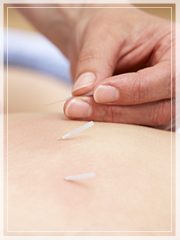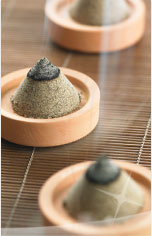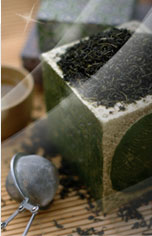PCOS in TCM
In TCM, development of PCOS is attributed to deficiency of Kidney Yang and to Phlegm-Damp accumulation. The Kidneys in TCM are responsible for growth, maturation, and reproduction, which include ovulation and menstruation in female. Long-term Kidney Yang deficiency is often accompanied with deficiency of the Spleen, which fails to perform its function of transforming and transporting fluids in the lower abdomen leading to Phlegm-Damp accumulation. It is Phlegm-Dampness that causes the formation of small cysts in the ovaries, while the deficiency of Kidney Yang leads to irregular menstruation, amenorrhea, or infertility. In many cases, there is also Qi (the vital enegy of the body) and Blood stagnation.
The factors that may cause PCOS are:
- Congenital weakness, early marriage and/or excessive sexual activity consuming the Kidney Qi
- Excessive consumption of greasy and rich food or improper dietary habits impairing functions of the Spleen and Stomach and producing Phlegm-Dampness
- Emotional stress or retention of the blood after delivery developing stagnation of Liver Qi and Blood stasis
- Internal heat/fire from prolonged stagnation leading to disharmony between Qi and Blood
NOTE: The names of organs are capitalized when referring to the entire, functional organ systems in TCM perspective: Liver, Blood, etc. The names of organs are lower-cased when referring to the distinct, biomedical organs: liver, blood, etc.
TCM treatment for PCOS
TCM treatment for PCOS is based on the different patterns of internal imbalance.TCM practitioners will determine which Zang Fu organs and meridians are out of balance, based on the clinical information collected via a complete medical history intake and a thorough diagnostic examination to analyze Yin & Yang, Qi, Blood and Body fluids. Once the pattern differentiation diagnosis is made, a personalized treatment plan will be designed for each patient. By restoring the balance and harmony of the whole body, TCM treatments can not only treat PCOS naturally, without medication, but also improve overall health of women.
Although Chinese herbal medicine will be the main treatment form for irregular menstruation, acupuncture, moxibustion, and dietary and/or lifestyle modification may be recommended to regulate periods more efficiently. A typical acupuncture treatment schedule may begin with 1-2 sessions a week, tapering as the patient’s condition improves. Healing time depends on the degree of imbalance in the organ systems; in general, it takes longer to restore the balance if multiple organs and meridians are involved.
Acupuncture

Acupuncture is a safe and effective treatment for PCOS. Acupuncture treatments can help regulate menstruation and relieve symptoms of PCOS by increasing blood flow to the ovaries, promoting the proper functioning of the reproductive organs, and contributing to normalizing hormone levels. Additionally, acupuncture treatments can assist in weight loss and help with hyperglycaemia by increasing insulin sensitivity and decreasing blood glucose and insulin levels, and reducing cortisol levels.
Studies have found that acupuncture and low frequency electro-acupuncture affect PCOS symptoms and regulate ovulation via modulation of endogenous regulatory systems, including the sympathetic nervous system, the endocrine system and the neuroendocrine system.1
Several studies showed that acupuncture significantly increases β-endorphin levels for periods up to 24 hour and may have regulatory effect on FSH, LH and androgen. β-endorphin increased levels secondary to acupuncture affects the hyperthalamic–pituitary–adrenal (HPA) axis through promoting the release of ACTH through stimulation of its precursor pro-opiomelanocortin synthesis.2
In a randomized controlled trial study, the acupuncture group showed significant improvements in anxiety and depression in women with PCOS, while the control group did not show any improvements in the emotional component of PCOS. The researchers in this study also noted that the patients receiving acupuncture reported improvement in the scores for health related quality of life (HRQoL), including social functioning, energy and vitality, and general health.3
Chinese Herbal Medicine
For most gynecological disorders, Chinese herbal medicines are recommended to correct imbalance of the body and to increase the effect of acupuncture treatment. Each patient will receive different herbal formulas according to the constitution and presenting signs and symptoms of PCOS.
In a study comparing the effects of a common Chinese herbal formula (Tiangui Fang) with metformin in PCOS patients, the researchers found that both metformin and Chinese herbal formula reduced the high serum levels of insulin in patients and induced regular ovulation. The herbal formula showed a better efficacy than metformin.4
Recent study published in 2020 demonstrated that herbal medicines normalize female hormones, diminish male hormones, recover the estrous cycle, ameliorate insulin resistance, and improve lipid metabolism in PCOS. It associated the mechanisms underlying the beneficial effects of herbal medicines on PCOS with anti-inflammation, anti-oxidative stress, inhibition of autophagy and/or apoptosis, and ovarian nerve growth factor (NGF) reduction. The authors concluded that herbal medicines can be considered as promising resources in the development of effective therapeutic agents for PCOS.5
Nutritional Advice
Because of the insulin resistance and impaired glucose metabolism found in PCOS, nutritional modification is necessary in preventing and treating signs and symptoms of PCOS. The best natural management for insulin resistance and impaired glucose metabolism is to lower the level of sugar intake from the diet and to avoid any food substance that the body can use as simple sugar. It is also important to eat regularly to moderate glucose load and minimize insulin resistance; having small meals, including some protein and good fat, every 3-5 hours is recommended.
What to Eat
- More vegetables, fruits, whole grains
These foods have low glycemic index (GI) and rich in fibers. Kale, broccoli, collard greens, bok choy, and cabbage contain indole-3 carbinol which helps the liver in regulating glucose and hormone metabolism. Fruits are lower on glycemic index and high in anti-oxidants. Whole grains, such as oat, barley, brown rice and quinoa, have complex carbohydrate which is more beneficial in stabilizing the blood glucose level.
- Bitter melon, fenugreek, cinnamon
They can help regulate blood glucose and reduce insulin resistance.
- Legumes
Beans, peas, lentils, and edamame are naturally low in fat and high in dietary fiber. They also are high in folate, phosphorus, potassium, iron, zinc, calcium, and selenium. Legumes have many of the B vitamins and are rich in anti-oxidants, which can prevent cell damage.
- Protein
It is important to include adequate protein with every meal, by adding seafood, eggs, nuts and seeds. It is safe to have organic and grass-fed meat since it changes the fats from healthy omega-3 fats to omega-6 fats when meat has been grain-fed.
What to Avoid
- Refined carbohydrates
The body immediately turns refined carbohydrates into glucose. Therefore, it is very important for women with PCOS to avoid refined carbohydrates to stabilize the blood glucose level. Foods with refined carbohydrate include: sugar (from soda, candy, syrup and artificial sweeteners), white flour and products made from them (pasta, breads, desserts, etc.), white rice, most breakfast cereals, rice cakes, and popcorn. Artificial sweeteners also affect the insulin levels the same way sugar does.
- Dairy products
Milk and dairy products are considered as ‘Damp’ foods in TCM and may exacerbate the problem. Try substituting unsweetened almond milk as an alternative to cow’s milk.
- Alcohol and Caffeine
Excessive alcohol and caffeine consumption can impair the function of the liver in regulating glucose and hormone level.
|







